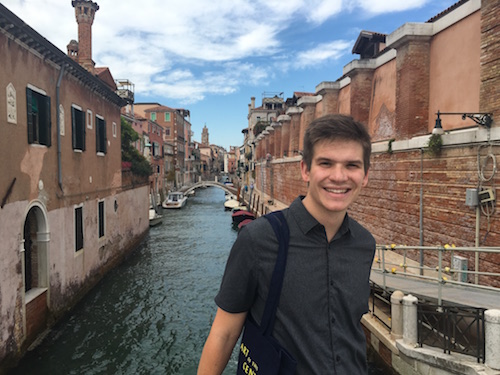Vibrant, super-smart and caring: these are just a few of the qualities that describe the dozens of interdisciplinary researchers at I-LABS. Their innovative ideas and technological savviness help drive the Institute's reputation as a world leader in child development and brain science.
And their kindness, professionalism and sense of humor greet all of the hundreds of families that volunteer each year for studies at I-LABS.
In the "People of I-LABS" series, we get to know the research scientists, post-doctoral fellows and other researchers who make up the elite team at I-LABS. This month, we learn more about Patrick Donnelly, a graduate student in the Brain Development & Education Lab.

Please tell us a little about yourself. Where do you come from? What are you doing at I-LABS?
I am originally from Flagstaff, Arizona and moved to Seattle shortly after attending Tufts University in Boston, MA. I am now a first-year Ph.D. student in Dr. Jason Yeatman’s lab here in the Department of Speech and Hearing Sciences.
Why did you decide to become a researcher?
I joined a research lab at the Center for Reading and Language Research during my second year at Tufts, captivated by the science of the reading brain. I worked there for the whole of my undergraduate studies immersed in a group that was committed to studying why children struggle and developing on-the-ground solutions. It was during this period when I realized that a career in research combined my two favorite things: nerding out and societal impact.
What big questions to you hope to answer with your research?
In my research, I hope to tackle questions about how the brain learns to read and how to leverage technology to universalize evidence-based learning. How does a child transition from translating sound to symbol, to thinking critically about text to challenge ideas, concepts, and preconceived notions? How can the ever-growing world of tablet-based or technology-based education make the most impact?
What research questions are you working on now?
Currently, I am working with Dr. Yeatman on an intervention study that asks how children respond to an intensive summer reading program, what predicts success for each, individual child, and what time-course describes growth of different reading-related skills.
What inspired you to study this topic?
I was inspired by both my own experiences with reading and by a professor and friend from Tufts, Dr. Maryanne Wolf. Reading has been a passion of mine my whole life and the study of literacy blends together the abstract and the concrete. Reading in the brain is vastly complex, combining the fields of language, audition, and vision, and is at the crux of the study of human cognition. On the other hand, reading, and the act of learning to read, inspires creativity and is a gateway to imagination.
What's your most significant career accomplishment so far?
So far, it’s a tie between the opportunity to run a large-scale reading intervention last summer and the recent launch of the Foundations of Literacy and Development of Literacy Outreach modules in May.
What's your favorite part of working at I-LABS?
Its commitment to merging science and practice. The foundation of I-LABS is that early-learning research is pointless, unless it can empower those that can make change happen.
What is your most exciting memory from being in the lab?
During the intervention study last summer, one of the participants who struggled the most at the beginning, told me at the end of the summer that she was no longer afraid to read aloud at school in front of her peers.
How can people use your discoveries in their own lives?
People can use the research from our lab to spread awareness about reading disability and add to the mantra of developmental research that emphasizes the importance of early learning!
What’s something we might not know about you?
I attended my first academic conference at the age of 8 years old. I went to the American Association of University Presses Conference with my aunt and stuffed animal penguin, Roger.
###